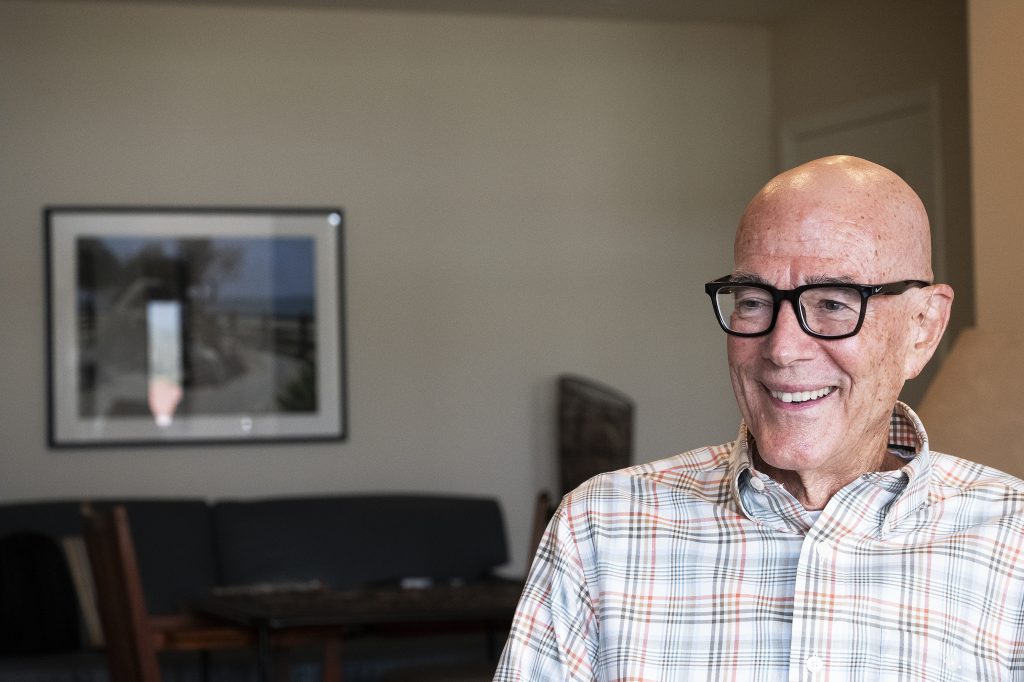In downtown LA two years ago, some 200 people gathered for a dinner honoring Richard Grant, the retiring president of the Dan Murphy Foundation.
The crowd was not, in the words of his wife, a “collection of professionals.” Sure, there were people who had worked with Grant in the world of Catholic education and philanthropy, but there were also friends with whom Grant had forged the unlikeliest of connections.
One of those friends was Carlos Granados. A graduate of Cathedral High School who grew up in Highland Park, Granados spent 18 years in state prison for attempted manslaughter committed while in college. About five years into his sentence, a chaplain at the LA Men’s Central Jail — where Granados’ mother volunteered — put him in touch with Grant.
The pair began to trade letters. A few times a year, Grant would drive up to visit Granados at whatever state penitentiary he was in at the time. The two would talk about books, life, faith, their families. He says Grant’s mentorship and “living example” were a godsend, helping him finish his college studies while behind bars — and build a foundation for the future.
“He encouraged me more through his example, his kindness, his open-mindedness,” said Granados. “He was the kind of man that I could envision wanting to be like, as opposed to all the other people I was around on a regular basis in prison.”
By the time he was released in 2016, Granados had earned a bachelor’s degree in accounting and business from Ohio University. He went on to earn a master’s in Business Administration. Today, he’s married with two young daughters and manages the accounting department at a professional services company.
“The only reason I was able to do all that was because of Richard’s support,” said Granados. “He made a huge impact on my life and really helped me change the direction of my life.”
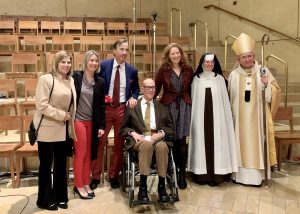
Stories like that about Grant abound, though most of them will probably never be told publicly. Those who know them well say that Grant and his wife, Maria, are humble people who value their privacy. They are not ones who like to talk about their good works or charitable deeds.
But Grant is known for his generous friendship to those in need, as well as to those in higher ranks.
Los Angeles Archbishop José H. Gomez said he is “privileged to call Richard my friend and mentor.”
The archbishop told Angelus that he is grateful for the Grants’ kindness and hospitality when he first came to Los Angeles in 2010.
“For decades now, Richard has been the driving force behind so much of what is good and hopeful and beautiful in the Archdiocese of Los Angeles,” Archbishop Gomez said. “He is a man of deep faith, with a true heart for the poor, and I am grateful every day for his wise counsel.”
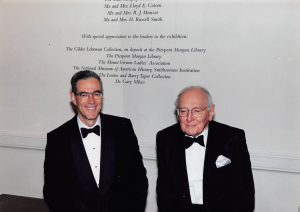
Grant retired from the Dan Murphy Foundation in 2020 after having served in the organization for 50 years.
Founded in 1957 by Daniel and Bernardine Donohue, the foundation was named for Bernardine’s father, Dan Murphy, the very successful Catholic businessman whose many charitable beneficiaries included the Archdiocese of Los Angeles, the construction of Catholic Girls High School, as well as Cathedral High School and the Little Sisters of the Poor Home in Boyle Heights.
Continuing her father’s work, Bernardine used her philanthropy to continue to promote vocations as well as service to the poor and disadvantaged youth. But the foundation’s focus increasingly turned to education, especially high schools in the inner city.
When Bernardine died in 1968, Grant, whose father was the foundation’s first treasurer, came on as a board member. He would succeed his father as treasurer, before becoming executive director and, in 2008, president.
Under Grant, the foundation increasingly turned its attention and support toward all facets of Catholic education, most especially those schools located in the inner city.
With shifting demographics and socio-economic trends, those schools were finding it increasingly hard to survive.
“The challenge of [the inner city] high school system is how to address things in what is always a very fluid situation,” Grant said. “There is always going to be need, there are so many things that you need to be aware of and address.”
And most of those things are not of the shiny, eye-catching architectural variety that come with artist renderings. These are far more essential.
“The kind of work [the Dan Murphy Foundation] makes possible is the kind we call plumbing and poetry,” said Paul Escala, superintendent of Catholic schools for the Archdiocese of Los Angeles.
“It’s the not-so-sexy stuff that no one is interested in because no one is interested in putting a plaque on a bathroom. But bathrooms matter. They matter a lot. So does paint and safety systems. Dan Murphy recognized that. Richard Grant recognized that a big fancy building doesn’t matter if it’s next to a dilapidated building that isn’t safe for kids.”
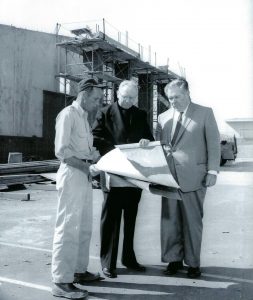
Grant cites the work of Cardinal James McIntyre, archbishop of Los Angeles from 1948 to 1970, who presided over Southern California’s post-war population boom, and at one point was overseeing the building of a new church every 66 days and a new school every 26 days.
Cardinal McIntyre, Grant said, “believed that a Catholic elementary and high school education was critical because, by stressing not only religion, but also math and English, it made clear that everyone should be able to develop and unleash their God-given talents.”
When parents can’t afford to give their children a Catholic education, enrollments drop and high schools close. It happens. In fact, in 2008, a Catholic all-boys high school located in Los Angeles closed due to dwindling enrollment. The name of the school? Daniel Murphy High School, named in the 1960s after the foundation’s namesake.
Still, there are success stories such as Cathedral High near downtown LA, which also experienced a drop in enrollment and looked to be in danger of closing itself. But concerned alumni, getting help from organizations such as the Dan Murphy Foundation, managed to not only save the school but erect a new building for classrooms as well as a new gym.
Grant considers the success story of Cathedral High “a perfect example of how people came together to make that happen.”
“It took more than a foundation, it took more than money to make it work. It takes a team of committed individuals,” said Grant. “It’s about passing the ball and allowing people to help.”
Grant said it was his father who instilled in him that all labor was sacred. His father, he said, was “my best teacher. He looked at things, saw what there was to do and then would say, ‘Let’s do it.’ He was a wonderful example to pitch in and do things. That was always part of my life growing up.”
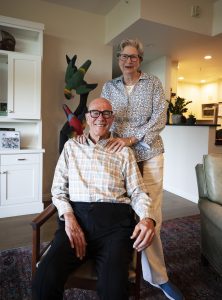
And it has stuck with him to this day. Now retired and living with his wife in Pasadena, Grant remains a part of the foundation’s board. Maria is a board member emeritus. She said one reason her husband has always done any job that needed doing is because he never saw the foundation as a job in the first place.
“He never approached it as a business,” Maria said. “It has always been about the mission of the foundation, and the mission has always started with people. The foundation has the best board of really good people.”
To David Fuhrman, Grant’s successor at the foundation, “Richard is a doer, there is no task too small or beneath him. He just rolls up his sleeves and takes care of it.”
By “sleeves,” he means his actual, well, sleeves. At events involving the foundation over the years, friends and associates can all recall the times they caught Grant picking up this, sweeping up that, or moving something from here to there.
“If you were at one of these events, you really wouldn’t know Richard was the head of the foundation,” said Heidi Talbot, the Dan Murphy Foundation’s chief administrative officer. “Because he would just roll up his sleeves and be doing whatever it is needed to be done, without a peep out of him.”
To his wife, Grant is “a true believer in the mission of Catholic education. He firmly believes in what it can provide — the faith and guiding light — and he firmly believes everyone should have access to it, no matter where you were born or who your parents are.”
Though he has retired from everyday duty, Grant said he still keeps in constant touch with everyone at the foundation and sees great things ahead.
“It was time for me to move on and I couldn’t have left things in better hands than with David and Heidi,” he said. “And Paul Escala has such a wonderful vision of things to come. They are all going to make this work.”
Escala said, if it does, it will be with the ongoing example of Grant.
“All that he’s been able to accomplish, all those he’s been able to bring together for a purpose, he’s become an incredible force multiplier,” Escala said. “He’s always been the first one to roll up their sleeves. We’re blessed to have him as a model.”
